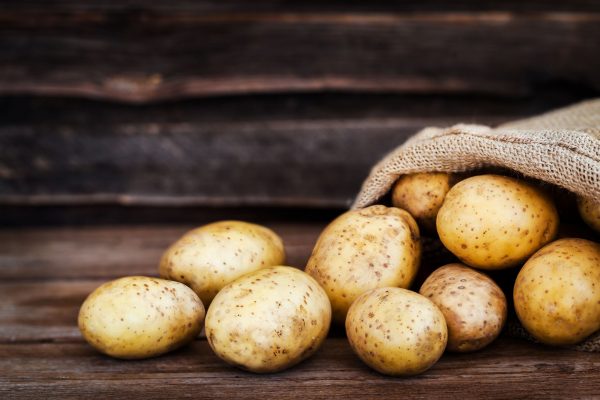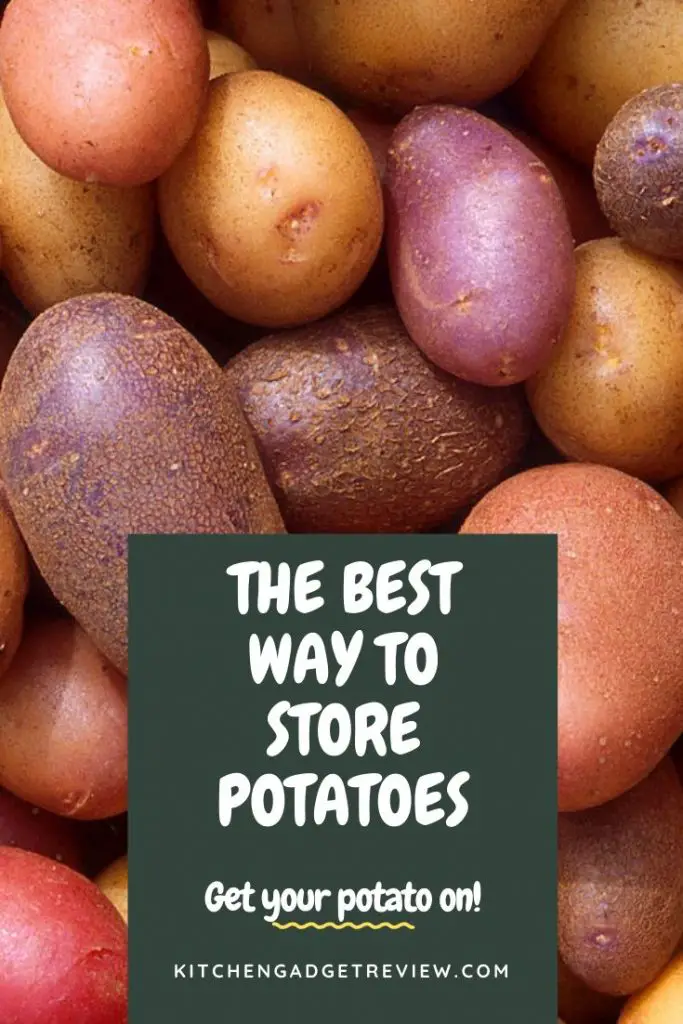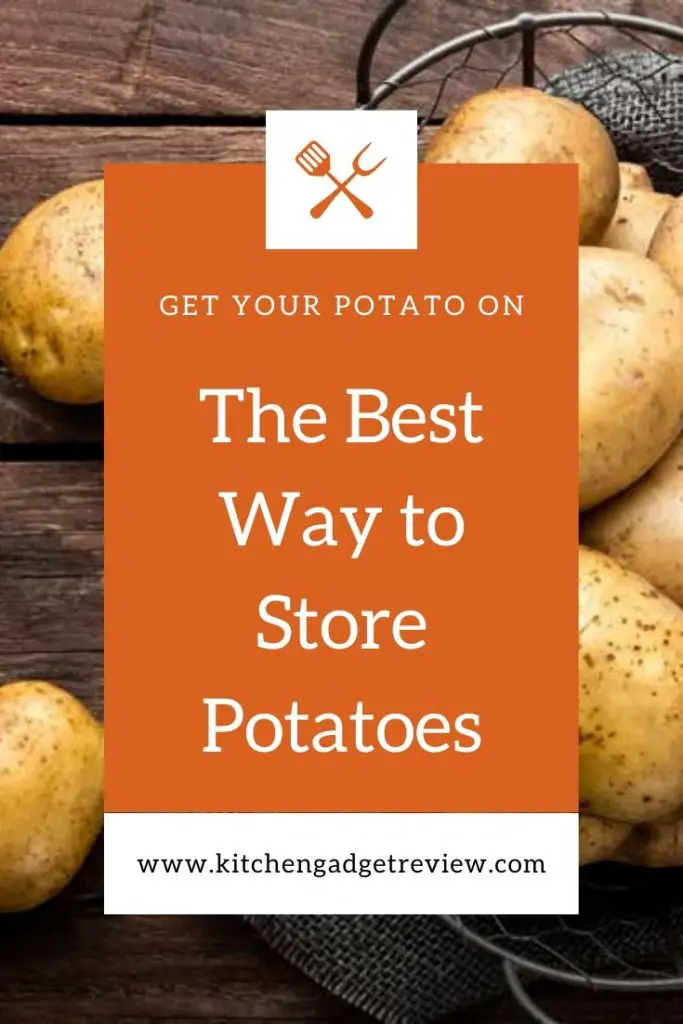Potatoes are root vegetables that supposedly ended the famine in northern Europe after it was introduced into the continent in the 16th century. Aside from its historical significance, the potato also offers several health benefits for people who include it in their daily meals. Of course, you’ll want to find out how to store potatoes the best way, right?
While potatoes have a long shelf life, it is still important to follow proper storage procedures so they can last up to five weeks without refrigeration. In this regard, we listed some potato storage methods you can follow if you want to have your own stock of potatoes in your home.

Tips for Storing Potatoes
How to Store Potatoes
Are you ready to get into all the details about the best way to store potatoes? Then keep on reading!
#1: Store raw potatoes in a cool, dry place
Raw potatoes have a long shelf life. But this shelf life is affected by temperature. If the temperature is high, the shelf life will be shorter. On the other hand, you can increase its shelf life if the storage area is cool. Moreover, a cooler storage area allows potatoes to retain their vitamin C content.
It is also important to jeep potatoes away from direct light, be it sunlight or fluorescent light. Exposure to light will cause potatoes to turn green since it will produce chlorophyll. Additionally, sunlight will cause potatoes to produce solanine, which is a toxic chemical.
#2: Store homegrown potatoes after curing
While most people buy potatoes from the local market, there are some who grow their own potatoes. If you are one of those self-sufficient households, you should “cure” the potatoes before you store them. Curing means to store potatoes in temperatures of up to 65 degrees Fahrenheit for two weeks.
In these conditions, the skin of the potato will thicken and heal minor blemishes during harvesting. It will also minimize instances of decay while they are stored. After the curing process, you can store the potatoes in a cool, dark storage area.
#3: Avoid washing potatoes before storage
One thing you need to avoid before storing potatoes is to prevent moisture from accumulating on them. Moisture promotes the growth of bacteria and mold. Even as you may want to wash off any dirt on them since they grow underground, you should avoid it so the potatoes will last longer
You can wash the potatoes just before you use them. Rinsing and scrubbing off any dirt on the potatoes will be sufficient for you to prepare the potatoes for your dishes. If you are concerned with the presence of pesticide residue, you can rinse potatoes in a vinegar or salt solution to remove any residue.
#4: Store peeled or sliced potatoes in water
Once you peel or slice potatoes, they will change color quickly once they are exposed to air. Due to this, you should store them in water before putting them in the fridge. The water will prevent peeled or sliced potatoes from turning brown.
But you should use them within 24 hours since the potatoes will absorb the water and become soggy. In this regard, you should avoid peeling or slicing potatoes if you are not going to use them within the day.
#5: Store excess peeled or sliced tomatoes in vacuum-sealed bags
If you peeled or sliced more potatoes than you need for the day, you can store them in vacuum-sealed bags so they will last longer. Just make sure you remove any moisture before you put them in the bags. After putting them in the bags, remove the air with a vacuum sealer and then store them in the fridge where they can last for a week.
#6: Store potatoes separately from other produce
Similar to other products, it is advisable to store potatoes separate from other produce. Ethylene is released by many fruits and vegetables during the ripening process. The same gas can cause raw potatoes to quickly soften.
Due to this, you should store raw potatoes away from other fruits and vegetables. You can store them in cool, dark places with suitable ventilation to extend their shelf life.

How to Store Potatoes at Home
What to Do With Excess Potatoes
The humble potato is a staple in many cultures around the world. It has been used for many dishes for thousands of years. So, you will have no shortage of ideas on what to do with them, especially if you have more than you intended to use in your dishes.
While you can store raw, unpeeled potatoes for a couple of months, you have the option of turning them into mouthwatering dishes your family and friends will love. Check out some of the things you can do with excess potatoes in the kitchen.
Potato Salad
Who doesn’t love a potato salad? If you have leftover baked potatoes, you can whip up a potato salad you can serve for dinner. Making a potato salad is quite easy and you can use your mad kitchen skills to create your version of this well-loved salad.
The first thing you need to do is to cut leftover baked potatoes into cubes. Then mix them with other ingredients you want in the salad. You can add hardboiled eggs, some celery, pepper, and a mustard and mayo mix.
Shepherd’s Pie
You can also use any excess potatoes you have to make Shepherd’s Pie. This classic dish only requires a few ingredients in addition to the potatoes. The process will also be easier if the potatoes you have are already mashed.
Cook up some vegetables and meat for the filling. Make some roux using water and flour. Put the vegetable and meat mix in a casserole and pour the roux on it. Then put the mashed potatoes on top before baking it at 350 degrees Fahrenheit for 30 minutes. You can also add some cheese on top to make the dish more interesting.
Scrambled Eggs with Potatoes
Looking for something simple yet interesting for breakfast? Well, you can make your own scrambled eggs with potatoes. The dish will be easier if you use excess French Fries that you can dice. You can also dice some potatoes for the dish.
Cook the diced potatoes together with water, oil, and some salt. Once the potatoes are lightly browned and the water has evaporated, you can add the beaten eggs into the potatoes and scramble them.
Homemade Fries
Who doesn’t love homemade French fries, right? They’re a delicious treat and can either be made in the oven or in a deep fryer for that restaurant quality taste. Check out this article for tips and tricks
And, why not pair it up with some homemade burger patties? Trust us on this one. Everyone will be coming back for more in a big way!

Keeping potatoes fresh
Summary on How to Store Potatoes
Potatoes may have a long shelf life, but some factors will affect how you can store them at home. Due to this, you should know the proper way of storing them until you need them for a dish or two.
FAQs for Storing Potatoes
There are a number of common questions that people have about how to store potatoes. Here are the answers to some of the most popular ones.
How Long Can you Store Potatoes?
You can store potatoes for 3-5 weeks in a cool, dry place like a pantry or 3-4 months in the fridge, although this will change how they taste. How long potatoes last depends on the type of potato, humidity and storage method.
How do you Keep Potatoes from Rotting?
To keep potatoes from rotting, put them in a well-ventilated container and then store them in a cool, dry place. For example, the basement or a cupboard that is rarely opened. Storing raw potatoes in the fridge can affect their taste in a negative way.
Can you Eat Potatoes Straight from the Ground?
If you grow your own potatoes, you can harvest, wash and then eat them straight from the ground. This is actually the preferred method instead of storing them for later use.
Should I Wash Potatoes Before Storing?
Potatoes often have dirt on them since they are grown underground. You may be tempted to rinse off the dirt before storing them, but they will last longer if they are completely dry. Instead, wash potatoes directly before cooking them. Moisture promotes fungus and bacteria growth.
Can you Freeze Fresh Potatoes?
It’s not recommend to freeze fresh potatoes because of their high water content. However, if you par-cook them first, either by boiling or frying then it’s possible to freeze them without them become mushy or discoloured. In addition, waxy potatoes freeze better than starchy ones because of their lower water content.
Have your Say about Storing Potatoes
Have any other ideas on how you can store potatoes? Tell us about it below. We’d love to hear from you.
Also be sure to give this article a share on Facebook, Pinterest or Twitter. It’ll help other potato enthusiasts, like yourself find this useful resource about potato storage.
